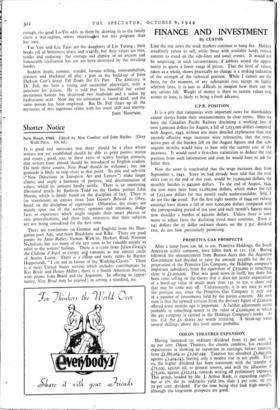Shorter Notice
New Road, 1944. Edited by Alex Comfort and John Bayliss. (Grey Walls Press. 10s. 6d.) IT is good and necessary that there should be a place where writers not yet established should be able to print poems, stories and essays ; good, too, in these years of scanty foreign contacts, that writers from abroad should be introduced to English readers. On both these counts, New Road should be welcome ; but our gratitude is likely to stop short at that point. Its title and sub-title (" New Directions in European Art and Letters ") make larger claims, and imply a harmony of purpose, and discrimination of values, which its contents hardly justify. There is an interesting illustrated article by Ruthven Todd on the Gothic painter John Martin, which is firmly based on the discipline of fact. There is (in translation) an extract from jean Giono's Refusal to Obey, based on the discipline of experience. Otherwise, the essays are mainly spun out of the writers' opinions and emotions, dodge facts or experience which might torpedo their smart phrases or easy generalisations, and show little awareness that their subjects are not being considered for the first time.
There are translations (in German and English) from the Hun- garian poet Ady, and from Baudelaire and Rilke. There are good poems by Anne Ridler, Vernon Watk-ns, Herbert Read, Norman Nicholson, but too many of the rest seem to be valuable mainly as relief to the writers' feelings. There is a tcene from Julien Gracq's Au Château d'Argol as creepy an romantic as any sinister castle of Arsine Lupin. There is a chlap and nasty satire by Rayner Heppenstall, "I am not in favour of the Working-Classes." There is a short United States section, which includes contributions by Kay Boyle and Henry Miller ; there is a South American Section, with poems from Brazil and the Argentine. In offering an oppor- tunity, New Road may be praised ; in setting a standard, no.


























 Previous page
Previous page